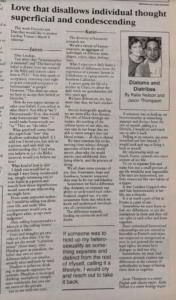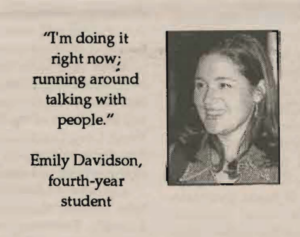Katie Monsen ‘96 and Emily Davidson ‘98 were two allied PLU alumnae whom Beth recommended I contact. Though they didn’t overlap too much in their years at PLU, they both dedicated themselves to formal and informal allyship through student organizations and their social circles. Katie wrote a column in The Mast that she leveraged to combat the anti-queer editorials from the editor-in-chief. Emily was the ASPLU Diversity Director and founded a Spanish club and Latino/a student organization called Puentes.

Katie and friend Jason Thompson respond to Lindsay Tomac’s anti-queer editorial in The Mast in 1996.
Katie came to PLU from Spokane as a born-and-raised Lutheran. She quickly got involved in writing for The Mast and in her dorm community in Tingelstad. She met members of Harmony, like Nikki Plaid, and Beth Kraig organically, as well as her then-boyfriend (now husband) Forest. By the time she was a senior, she was writing a recurring column in The Mast with Jason Thompson, which twice argued against the anti-queer editorials from editor-in-chief Lindsay Tomac in 1996. In one issue, she countered the editorial by drawing on Jesus’s teachings, refuting the idea that Lindsay’s approach was rooted in true Christianity, and urged readers to “Love my neighbor as I love myself, in a way that respects the needs of my neighbor.”
Katie told me a story that perfectly encapsulated the tension in her working relationship with Lindsay. On a day when students wore denim to express allyship for National Coming Out Day, Katie came into the newsroom and saw that Lindsay was upset. Katie hadn’t seen the signs for the event, but had happened to wear blue jeans.
“Thank goodness I saw it,” Lindsay said.
Katie replied, “Oh, yeah, I just happened to wear jeans.”
“But then I looked down, and she was wearing khakis,” she told me. “I think she’d gone back and changed.”
Katie credits PLU’s community, and Forest, for her ethic of allyship. Forest had taken classes with Beth and Tom and introduced Katie to the ideas they shared. They both took these ideas from the classroom and integrated them into their own lives, at times having hard conversations with friends regarding judging and excluding queer folks.
“And then in our lives together after college, we’ve been able to keep growing in how we show up for the queer community. Of course I can never know what my allyship would have been like without being so deeply linked with Forest, but I know he’s been such an important part of it,” Katie said.
She admitted to being nervous to revisit her column in The Mast, worrying that some of what she wrote may have been out of date. But her words stand the test of time, showing her commitment to authentic allyship, even though at the time she felt like “a baby ally, putting out my first little leaves.”
Emily, a self-confessed “major band nerd,” was first drawn to PLU in part by the School of Music and the leadership of Raydell Bradley, the first Black PLU band director. She’d been involved in activism throughout high school and wanted to continue engaging with these causes, particularly Hispanic/Latino organizing, in college, so she felt that the opportunity to study in the Hispanic Studies Department, as well as the connections to the Multiethnic Resource Center that she received from her Rieke scholarship, made it a perfect place. Once she arrived in Parkland, though, she “quickly discovered there was no Latino organization on campus.” She also felt some tension within the goals of the Multiethnic Resource Center.
“I always felt really conflicted about how that space was or was not a queer-friendly space,” Emily said. “Just due to experiences that other friends had had there. And I think some of us were looking to broaden our idea beyond multiculturalism to, you know, this diversity that we use more broadly today.”
Along with faculty member Tamara Williams, Emily launched Puentes her first year at PLU, and went on to help form the Diversity Coalition in the fall of 1997, with leaders from groups like the Asian Pacific Islander Club, the Muslim Students Association, B.L.A.C.K. at PLU, and Harmony. The groups intentionally networked with each another to support one another’s events and have hard conversations about their goals, especially regarding the inclusion of queer students, which initially caused some tension within the coalition.
Emily said she was driven to create these spaces because she had seen how important the issue of intersectionality was for her friends and fellow students, even though “we didn’t even have that word yet.” Her friend Martín Torres was queer and Latino, and she had seen “friends experiencing what we would call micro-aggressions now that weren’t — they were not micro, they were pretty fucking macro — I mean, they’re major, like kids coming up to you and like saying ‘I’m praying for you,’ you know, things like that.”
It was important to her that Puentes and her other work prioritized intersectionality to shift the campus culture. “I think for me, it was wanting to create spaces of belonging that didn’t require people to let go of multiple parts of themselves when they entered a different space,” Emily said. “So you know, I wanted, for example, Puentes to be a place where people could feel completely open, being queer and Latino, right, for example, and so I wanted those spaces to be inclusive.”
Emily describes why she was driven to create inclusive and queer-affirming spaces and coalitions during her time as a student at PLU.
Emily and Katie, now both educators (at PLU and UCSC, respectively), shared stories of visiting or returning to PLU years after their time there as students. Emily was amazed to see the Diversity Center (established in 2001) in full swing, with pride flags in the windows — a familiar sight for today’s Lutes. Rather than intersectionality efforts coming entirely from students and impromptu organizing, she was seeing intentional structures, conversations, and faculty hires that prioritized it.
“I remember Erin Dana being like this amazing leader in that center and I was like, wow, what happened here in the in-between?” Emily said. “I don’t think tensions were resolved or minds were changed, or — I just think we made enough noise to keep something rumbling.”
Katie said that seeing today’s students gives her hope that “the overall momentum will hopefully be forward” despite anti-queer and anti-trans efforts alive in the world today. She fondly remembers PLU for connecting her to her neighbors and inspiring care for her community.



